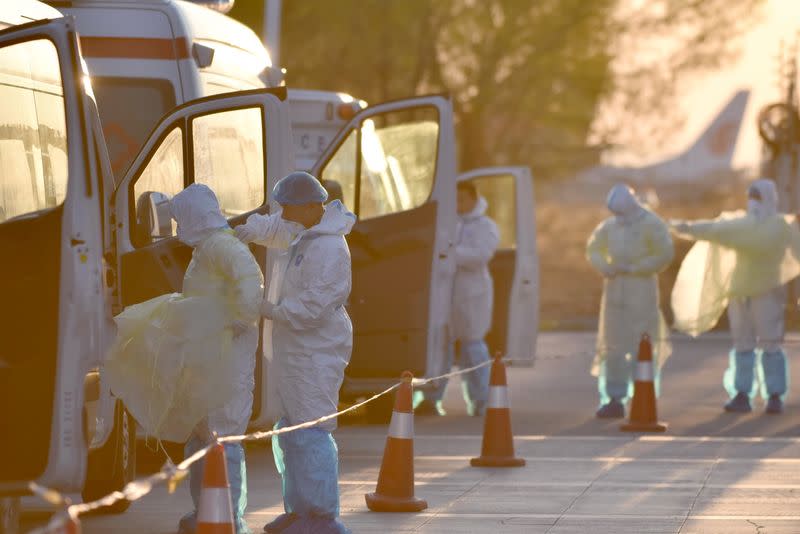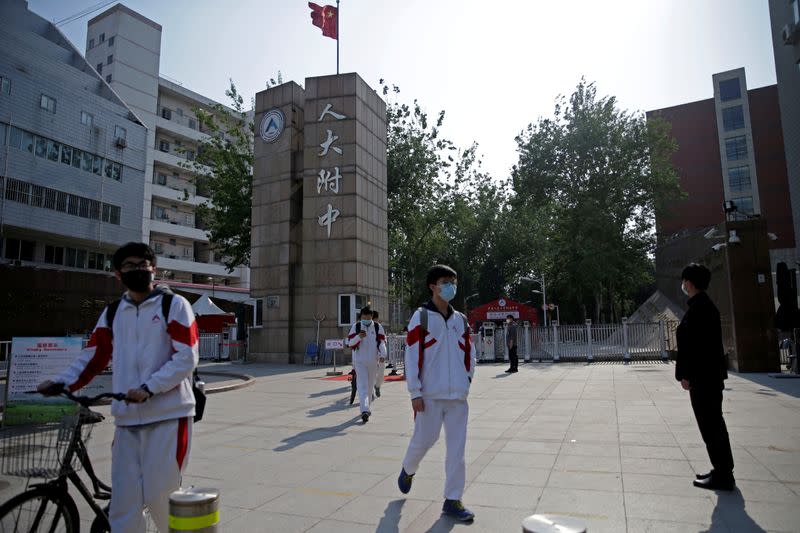China to keep coronavirus tests focused, stops short of wider testing
By Gabriel Crossley and Lusha Zhang
BEIJING (Reuters) - China will focus testing for COVID-19 on high-risk groups such as people from infected areas or with symptoms, the head of a top state research institute said on Monday, suggesting that authorities are not about to rush into large-scale testing.
The government said recently that it intends to carry out more widespread testing to quickly identify and isolate carriers, following spikes in cases linked to people arriving from abroad and new local transmissions.
But China also said accuracy of tests must be improved and more laboratories should be set up. It is also unclear who would pay for any mass testing of hundreds of millions of people - the state, employers or the individual.
"(The country's) current testing strategy matches our epidemic control and prevention strategy," Jin Qi, president of the Institute of Pathogen Biology at the Chinese Academy of Medical Sciences and Peking Union Medical College.
Tests are being carried mostly on high-risk groups such as people with symptoms or from infected areas, schools and hospitals, Jin told reporters at a briefing in Beijing.
Other groups that request testing, such as those returning to work that involves a high density of people, will receive tests as far as is possible, he added.
While people running a high fever and suffering from breathing problems are easy to identify, some carriers of the novel coronavirus show few or none of the usual symptoms and are just as capable of infecting others.
As of Sunday, 974 asymptomatic cases were under medical observation, Chinese health authorities said, after testing positive for the virus.
There is no official estimate of the number of asymptomatic carriers who are yet to be tested.
FINANCIAL CONSIDERATIONS
Wuhan in central Hubei province, the epicentre of the outbreak in China, has doubled the number of tests to 60,000-65,000 a day since a lockdown on the city ended on April 8, to ensure that only residents who test negative leave the city.
To keep track of people's test status, the government recently launched an online mobile service allowing people to retain a history of their test results.
But not all are convinced that mass testing is needed.
"I don't think it is necessary to get tested if people stay in the city and show no symptoms," said Meng, 32, who works for an overseas education services company in Beijing.
"Besides, there are people who show symptoms two days after the coronavirus test. If I do the test today, can I guarantee that I will not be exposed to the virus tomorrow?"
There are also financial considerations for the individual paying for tests. In China, the nuclei acid test, which involves swabbing the back of a patient's throat or respiratory tract to detect the virus' genome, costs at least 200 yuan ($28.26) on average.
The cost for people who need multiple tests over a period of time could be significant, especially those earning low wages such as migrant workers. Some patients also test positive only after multiple rounds of testing.
"The bill could be spilt," said Meng, declining to give her full name.
"Both the individual and the government should bear half of it, which will reduce the pressure on both sides."
(Reporting by Gabriel Crossley; Additional reporting by Lusha Zhang and Beijing Newsroom; Writing by Ryan Woo; Editing by Raissa Kasolowsky)



